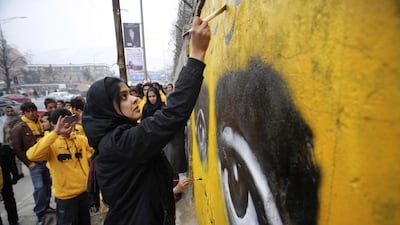Mariam Aman is a 28-year-old Afghan journalist for BBC Persian. She describes the political awareness among Afghans and their excitement about voting in the presidential election last month, despite the danger. She also describes how Afghans, especially youth, are concerned about security as international troops prepare to leave. Follow Ms Aman on Twitter: @BBCMariamAman
Afghans are passionate about politics.
After what they have gone through in the past 30 years, they are aware of what their government, and those in other countries, are doing. They have lived on the front lines of the Cold War. They have experienced the devastation of terrorism first hand, they realise the stakes are high.
In the run-up to this month’s election, you could feel the excitement and anticipation grow by the day. Despite the bad winter (do you know how harsh the winter is in Afghanistan?), they showed up in droves to pre-election rallies. On voting day, the turnout was nearly 60 per cent — much higher than in previous years.
A reason for the high turnout — and excitement — seemed to be the youth of Afghanistan, where more than 70 per cent of the population is younger than 25.
They could been seen on the campaign trial, tirelessly volunteering for their favourite candidates. They worked non-stop on social media sites and became active in civil society groups.
There were many volunteers that campaigned for the different candidates. They came every day and were dedicated workers. They were active in social media and active in civil society.
There were many reasons for this excitement and the presence of all these youth.
Part of the underlying motivation for such enthusiastic participation is a considerable anti-Taliban sentiment that is prevalent here, especially among the young.
Afghans took part in the election as a way to defy the Taliban, despite a spike in violence in the weeks before polls opened.
Afghans also have a strong desire for change. They are tired of the corruption that plagued the government of Mr Karzai for the past 13 years, during which the country received billions of dollars in international aid but saw little effect of that money on the ground.
One of the most important issues in this election was the security situation, especially the Bilateral Security Agreement, which sets conditions for US troops to remain in the country after this year.
The deal is currently in limbo because the current Afghan president, Hamid Karzai, refuses to sign it.
This has everyone here worried.
But the two leading candidates — Abdullah Abdullah and Ashraf Ghani — were clear about the BSA, both of them stated that signing it would be one of the first things they do if elected.
Afghans are worried that not only will violence increase when foreign troops leave, but the economy — which is relies on the service industry — will shrivel up.
However, I don’t know if it was only a passing phenomenon or something far bigger, but this election has created an environment of optimism.
Just two months ago there was a pessimism about the future in Afghanistan.
I don’t know if Afghanistan will again fall into the trap of civil war and tear itself apart.
But the participation in the election changed people’s perceptions.
It shows the political maturity of the Afghan people. And for a country that has known decades of war, there is no other way.
foreign.desk@thenational.ae

